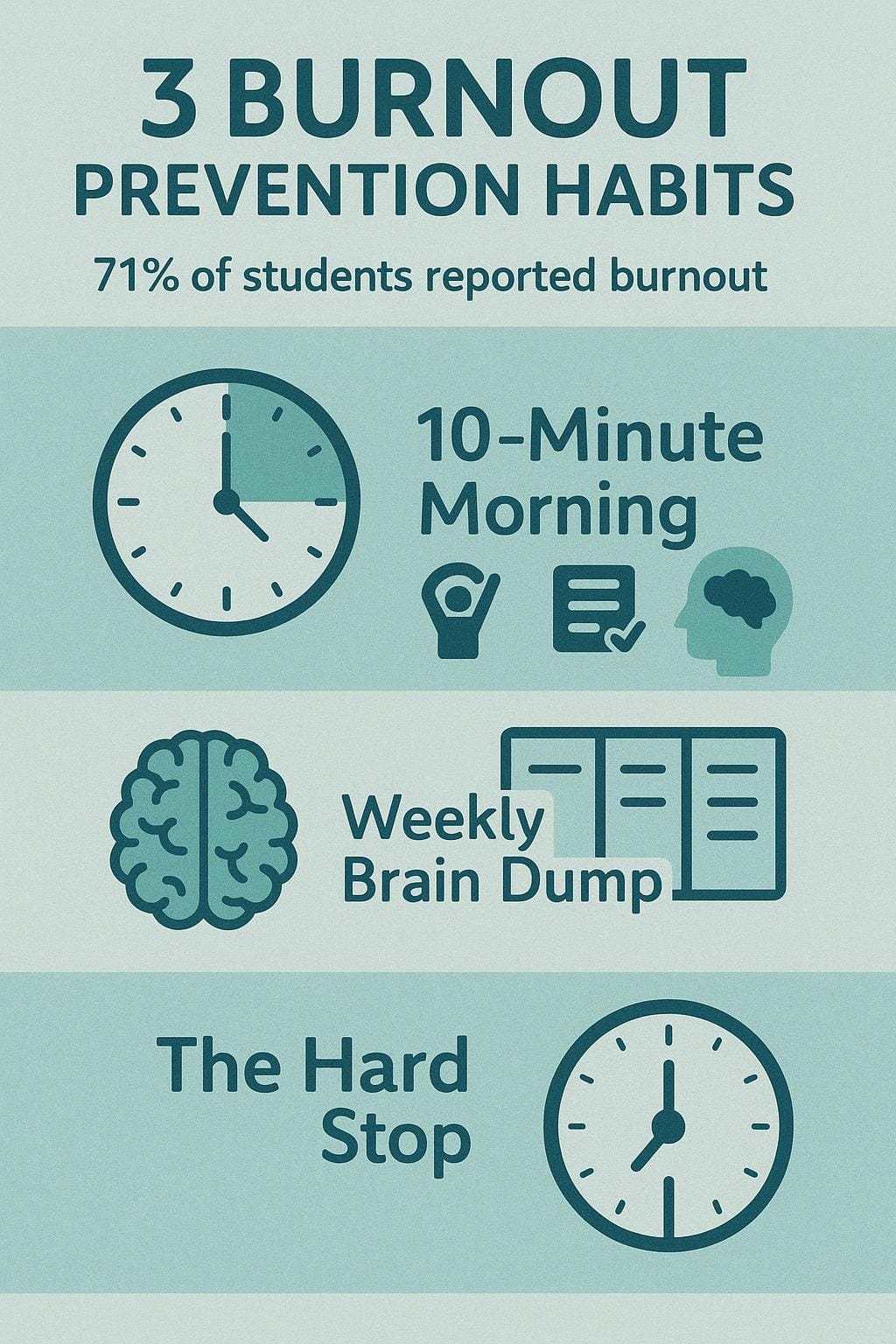The emerging epidemic of burnout among college students isn’t just affecting grades—it’s fundamentally changing brain function and long-term mental health outcomes. Preventative mental maintenance has become essential as research shows that by the time midterms arrive, the neurological damage of chronic stress may already be setting in.
Key Takeaways
- Morning routines create a mental firewall against the day’s stressors
- Weekly brain dumps prevent cognitive overload before it affects performance
- Setting non-negotiable boundaries around study time actually improves productivity
- Simple preventative habits are far more effective than crisis management
- Consistent small actions outperform occasional intensive self-care
The Burnout Epidemic Among Students
A startling 71% of college students reported experiencing burnout in 2021, according to the American College Health Association. Chronic academic stress doesn’t just feel uncomfortable—it actively reduces cognitive function, impairs memory, and makes concentration nearly impossible.
The traditional approach of pushing through until breaks often backfires as the neurological impact compounds over time. Most students wait until they’re already experiencing significant symptoms before addressing their mental wellness, turning what could have been simple maintenance into complex recovery.
The most effective approach to student mental health isn’t reactive care but daily preventative practices. Just as physical health requires consistent small actions rather than occasional intense interventions, protecting your mental health requires building sustainable daily habits.
Habit #1: The 10-Minute Morning – Your Mental Firewall
The first ten minutes after waking literally program your brain’s stress response for the next several hours. When you immediately reach for your phone, you trigger a dopamine cascade that sets your brain seeking more quick hits of stimulation throughout the day, making sustained focus nearly impossible.
Creating a deliberate morning micro-routine can establish a protective mental barrier against the day’s stressors. This simple practice consists of three components: 2 minutes of gentle stretching to wake the body, 3 minutes of intention setting in a journal, and 5 minutes of visualization of successfully navigating the day’s challenges.
Research suggests students who begin their day with intentional non-digital activities report 31% lower stress levels compared to those who immediately check notifications. Implementation requires minimal effort: prepare your morning space the night before with water, a journal, and critically—no phone charger within reach.
One pre-med student I worked with reduced her morning anxiety by 40% after just two weeks of this practice. She found that this proactive self care routine gave her a sense of control before facing her demanding schedule, making her less reactive to stressors throughout the day.
Habit #2: The Weekly Brain Dump – Your Cognitive Reset Button
Our working memory has severe limitations—according to cognitive load theory, we can only hold about 4-7 items simultaneously before performance degrades. Unaddressed mental clutter from assignments, social obligations, and background worries compounds exponentially, creating a perfect storm for college stress and cognitive overload.
The weekly brain dump is a 15-minute practice that externalizes everything occupying mental space. Divide a page into three columns: urgent tasks, background worries, and upcoming deadlines—then write continuously without judgment, getting everything out of your head and onto paper.
The neurological benefit happens immediately: by externalizing thoughts, you free up cognitive resources that were being depleted by the mental effort of remembering. Time-blocking after the brain dump converts vague anxiety into concrete actions, transforming overwhelm into a manageable plan.
Students who practice weekly thought download exercises show measurably improved sleep quality and reduced rumination according to research. For maximum effectiveness, schedule your brain dump for Sunday evenings to clear mental space before the week begins, creating a reset that prevents anxiety management issues before they start.
Habit #3: The Hard Stop – Your Non-Negotiable Boundary
Late-night studying produces dramatically diminishing returns as cognitive function declines with fatigue. Research consistently shows that students with consistent study end times actually performed better on exams than those who pulled all-nighters, primarily because sleep consolidates memory and learning.
Determining your optimal Hard Stop time requires honesty about your chronotype and schedule. Avoiding burnout means recognizing when additional work becomes counterproductive—typically after 90-120 minutes of focused studying without a substantial break.
Creating a proper shutdown ritual signals to your brain that work is complete: review what you’ve accomplished, make a quick next-day plan, and physically close books and laptops. This practice creates psychological closure that prevents work from bleeding into your recovery time.
Many students report feeling intense guilt when implementing boundaries around study time. However, research from Fink (2016) shows that working longer rarely equals working better. Healthy habits like the Hard Stop create the recovery periods necessary for high performance when you return to work.
Building Your Personal Anti-Burnout System
The compound effect of these three simple habits over a semester creates a robust defense against burnout before it can take hold. Back to school health requires intentionally designing systems that protect your mental resources rather than depleting them.
Track your progress using simple metrics: morning stress levels on a 1-10 scale, weekly productivity satisfaction, and evening wind-down quality. If despite these preventative measures you notice burnout approaching, don’t wait—immediately increase recovery time, reduce non-essential commitments, and consider speaking with your campus mental health services.
Prioritizing mental wellness in achievement-focused environments takes genuine courage. Remember that your brain is the instrument of your success—and like any high-performance tool, it requires proper maintenance, not just repair after breakdown.
Implementing a self care routine through these three habits—the 10-Minute Morning, Weekly Brain Dump, and Hard Stop—creates the foundation for not just surviving the semester, but thriving through it. The best time to start isn’t when you’re already feeling overwhelmed—it’s now, when these practices can establish neural pathways of resilience before the pressure intensifies.
Sources
American College Health Association – National College Health Assessment (2021)
Fink, G. – Stress: Concepts, Definition and History (2016)
Hülsheger & Schewe – On the costs and benefits of emotional labor (2011)
Killgore, W.D.S. – Effects of sleep deprivation on cognition (2010)











